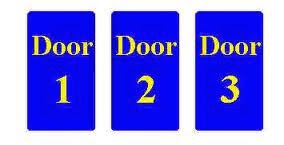Monday, April 13, 2015
TV Show
Games Reviewer
7:57 AM
brain
,
brain teasers
,
logic
,
logical games
,
logical puzzle
,
play puzzles online
,
puzzle
,
puzzle game
,
show
,
TV
No comments
:

The contestant picked the first door as his guess. At that point, the host walked to the third door and opened it. The door led to no prize, which is something the host knew perfectly well. He then gave the chance to the contestant to switch and pick the second door, if he so wished, or to stick to his first choice and stay with the first door.
Did the contestant have a greater chance of winning the car, by sticking with the 1st door, or by switching to the 2nd door? Or were the chances equal?
Notes:
The contestant knew three things: first, that the host doesn't want him to win; second, that the host was going to open one of the doors; and third, that the host would never open the door picked by the contestant himself... regardless of where the prize really is.
TV Show Puzzle Solution
This puzzle isn't particularly new, but it became very well known in 1990, thanks to the person that allegedly had "the highest IQ ever recorded" -- 228, according to The Guinness Book of WorldRecords. Miss Marilyn vos Savant (yes, it was a female) wrote a solution to this puzzle on her weekly column, published in a popular magazine. This solution led to waves of mathematicians, statisticians, and professors to very heated discussions about the validity of it.The contestant, according to vos Savant, had a greater chance of winning the car by switching his pick to the 2nd door.
She claimed that by sticking to the first choice, the chances of winning were 1 out of 3, while the chances doubled to 2 out of 3 by switching choices. To convince her readers, she invited her readers to imagine 1 million doors instead of just 3. "You pick door number 1," she wrote, "and the host, who knows what's behind every door, and doesn't want you to win, opens all of the other doors, bar number 777,777. You wouldn't think twice about switching doors, right?"
Most of her readership didn't find it as obvious as she thought it was... She started receiving a lot of mail, much of it from mathematicians, who didn't agree at all. They argued that the chances were absolutely equal, whether or not the contestant switched choice.
The week after, she attempted to convince her readers of her reasoning, by creating a table where all 6 possible outcomes were considered:
| Door 1 | Door 2 | Door 3 | Outcome (sticking to door 1) |
| Car | Nothing | Nothing | Victory |
| Nothing | Car | Nothing | Loss |
| Nothing | Nothing | Car | Loss |
| Door 1 | Door 2 | Door 3 | Outcome (switching to other door) |
| Car | Nothing | Nothing | Loss |
| Nothing | Car | Nothing | Victory |
| Nothing | Nothing | Car | Victory |
The table, she explained, shows that "by switching choices you win 2 out of 3 times; on the other hand, by sticking to the first choice, you win only once out of of 3 times".
However, this wasn't enough to silence her critics. Actually, it was getting worse.
"When reality seems to cause such a conflict with good sense," wrote vos Savant, "people are left shaken." This time, she tried a different route. Let's imagine that, after the host shows that there's nothing behind one of the doors, the set becomes the landing pad for a UFO. Out of it comes a little green lady. Without her knowing which door was picked first by the contestant, she is asked to pick one of the remaining closed doors. The chances for her to find the car are 50%. "That's because she doesn't have the advantage enjoyed by the contestant, ie the host's help. If the prize is behind door 2, he will open door 3; if it is behind door 3, he will open door 2. Therefore, if you switch choice, you will win if the prize is behind door 2 or 3. YOU WIN IN EITHER CASES! If you DON'T switch, you'll win only if the car is behind door 1".
Apparently, she was absolutely right, because the mathematicians reluctantly admitted their mistake.
Subscribe to:
Post Comments
(
Atom
)








No comments :
Post a Comment